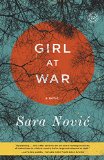Summary | Excerpt | Reviews | Beyond the Book | Readalikes | Genres & Themes | Author Bio

Excerpt
Girl at War
My best friend, Luka, and I spent the summer biking around the town square and meeting our classmates for pickup football games. We were freckled and tan and perpetually grass-stained, and now that we were down to just a few weeks of freedom before the start of school we met even earlier and stayed out later, determined not to let any vacation go to waste. I found him along our regular bike route. We cycled side by side, Luka occasionally swinging his front tire into mine so that we'd nearly crash. It was a favorite joke of his and he laughed the whole way, but I was still thinking about Petrovi?. In school we'd been taught to ignore distinguishing ethnic factors, though it was easy enough to discern someone's ancestry by their last name. Instead we were trained to regurgitate pan-Slavic slogans: "Bratstvo i Jedinstvo!" Brotherhood and Unity. But now it seemed the differences between us might be important after all. Luka's family was originally from Bosnia, a mixed state, a confusing third category. Serbs wrote in Cyrillic and Croats in the Latin alphabet, but in Bosnia they used both, the spoken differences even more minute. I wondered if there was a special brand of Bosnian cigarettes, too, and whether Luka's father smoked those.
When we arrived in the Trg it was crowded and I could tell something was wrong. In light of this new Serb-Croat divide, everything—including the statue of Ban Jela?i?, sword drawn—now seemed a clue to the tensions I hadn't seen coming. During World War II the ban's sword was aimed toward the Hungarians in a defensive gesture, but afterward the Communists had removed the statue in a neutralization of nationalistic symbols. Luka and I had watched when, after the last elections, men with ropes and heavy machinery returned Jela?i? to his post. Now he was facing south, toward Belgrade.
The Trg had always been a popular meeting place, but today people were swarming around the base of the statue looking frantic, milling through a snarl of trucks and tractors parked right in the cobblestoned Trg, where, on normal days, cars weren't even allowed to drive. Baggage, shipping crates, and an assortment of free-floating housewares brimmed over the backs of flatbeds and were splayed across the square.
I thought of the gypsy camp my parents and I once passed while driving to visit my grandparents' graves in ?akovec, caravans of wagons and trailers housing mysterious instruments and stolen children.
"They'll pour acid in your eyes," my mother warned when I wiggled in the pew while my father lit candles and prayed for his parents. "Little blind beggars earn three times as much as ones who can see." I held her hand and was quiet for the rest of the day.
Luka and I dismounted our bikes and moved cautiously toward the mass of people and their belongings. But there were no bonfires or circus sideshows; there was no music—these were not the migrant people I'd seen on the outskirts of the northern villages.
The settlement was made almost entirely out of string. Ropes, twine, shoelaces, and strips of fabric of various thicknesses were strung from cars to tractors to piles of luggage in an elaborate tangle. The strings supported the sheets and blankets and bigger articles of clothing that served as makeshift tents. Luka and I stared alternately at each other and at the strangers, not knowing the words for what we were seeing, but understanding that it wasn't good. Candles circled the perimeter of the encampment, melting next to boxes on which someone had written "Contributions for the Refugees." Most people who passed added something to a box, some emptying their pockets.
"Who are they?" I whispered.
"I don't know," Luka said. "Should we give them something?"
I took Petar's dinar from my pocket and gave them to Luka, afraid to get too close myself. Luka had a few coins, too, and I held his bike while he put them in the box. As he leaned in I panicked, worrying that the city of string would swallow him up like the vines that come alive in horror movies. When he turned around I shoved his handlebars at him and he stumbled backward. As we rode away I felt my stomach twist into a knot I would only years later learn to call survivor's guilt.
From the book Girl at War by Sara Novi?. Copyright © 2015 by Sara Novi?. Reprinted by arrangement with Random House, an imprint of Random House, a division of Penguin Random House LLC. All rights reserved.
Your guide toexceptional books
BookBrowse seeks out and recommends the best in contemporary fiction and nonfiction—books that not only engage and entertain but also deepen our understanding of ourselves and the world around us.